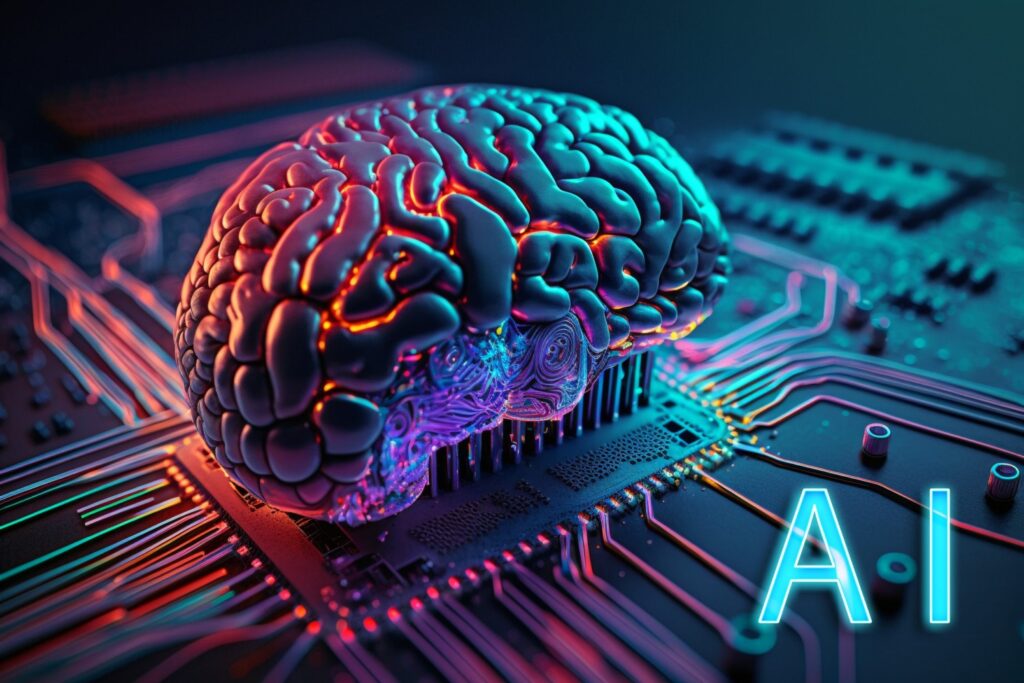or call: +1 (845) 347-8894
or call: +1 (845) 347-8894
Artificial Intelligence
Defining AI can be tricky, as it's not a monolithic entity but rather a vast field encompassing various technologies.
AI for business: Reinvent what's possible
In the most technological sense, Artificial Intelligence or AI refers to the simulation of human intelligence by machines which involves abilities such as learning, reasoning, problem-solving and decision making. This is achieved through supporting technologies like machine learning, deep learning, NLP and computer vision. Considering the extra-human intellingence of AI, it also has an interesting (or rather fearful) science-fiction aspect to it hinting at its role in a dystopian future controlled by Singularity – an evolution of AI so intelligent that its beyond human control. Regardless of speculations and theories, AI today is commonplace and the future belongs to it.

AI: Partner, not replacement.
Forget robots taking over – AI isn’t here to replace human thought. Instead, it’s a powerful supportive tool. While AI struggles with everyday tasks, it excels at data crunching. It can analyze massive amounts of information in a blink, uncovering patterns and suggesting solutions that would take humans ages. Think of it as a decision-making superpower.
AI can be termed as the next step in software evolution, It makes its own choices, even in unforeseen situations. This flexibility gives it a broader range of decision-making abilities than traditional software.
This flexibility makes AI valuable across industries. From guiding people around an office campus to predicting repairs for wind turbines, AI is finding its place in the world.
Are you ready to unlock the future of your business? Artificial Intelligence (AI) is no longer science fiction; it’s a powerful tool shaping the modern business landscape. It’s time to embrace this transformative technology and witness its impact on your bottom line, efficiency, and customer experience.
Why is AI crucial for your business?
In today’s competitive environment, staying ahead requires innovation. AI equips you with the tools to:
- Boost Efficiency: Automate repetitive tasks, streamline processes, and make data-driven decisions for smarter resource allocation.
- Enhance Customer Experience: Personalize interactions, predict needs, and offer proactive support, fostering loyalty and engagement.
- Gain Competitive Advantage: Identify market trends, optimize pricing, and develop innovative products and services ahead of the curve.
- Reduce Costs: Minimize errors, optimize operations, and predict potential issues for proactive maintenance, saving valuable resources.
The Future Powered by AI:
The potential of AI is limitless. Imagine:
- AI-powered robots collaborating with humans in the workplace.
- Self-driving vehicles revolutionizing logistics and transportation.
- AI-driven medical diagnosis and treatment, personalized for each patient.
- Adaptive learning systems tailoring education to individual needs.
The time to act is now. Don’t let your competitors become the pioneers of AI. By integrating this technology into your business strategy, you’ll be future-proofing your success and contributing to the revolutionary era of intelligent operations.
6 Ways Data and AI Work Together to Transform Your World
1
Unlocking Hidden Insights: Data, on its own, can be overwhelming and complex. AI acts as the interpreter, sifting through vast amounts of information to uncover hidden patterns, trends, and correlations that humans might miss. This empowers businesses to make data-driven decisions, predict future outcomes, and optimize strategies.
2
Automating Repetitive Tasks: AI excels at tackling tedious, repetitive tasks that consume valuable human time and resources. Imagine AI handling tasks like data entry, customer service inquiries, or even complex financial calculations, freeing humans to focus on more creative and strategic endeavors.
3
Personalizing Experiences: Data about individual preferences and behaviors allows AI to create personalized experiences like never before. This can range from product recommendations in e-commerce to tailoring educational content for individual students. The result? Happier customers, engaged users, and improved outcomes.
4
Boosting Efficiency and Productivity: By automating tasks, optimizing processes, and predicting potential issues, AI can significantly enhance efficiency and productivity across various industries. From streamlining manufacturing lines to optimizing logistics routes, the impact is tangible and measurable.
5
Developing Innovative Solutions: The collaborative power of data and AI fuels innovation by uncovering new possibilities and identifying novel solutions to complex problems. This could involve anything from developing new drugs and materials to designing climate-resilient infrastructure.
6
Predicting and Mitigating Risks: By analyzing historical data and identifying patterns, AI can predict future risks and proactively take measures to mitigate them. This applies to financial fraud detection, cybersecurity threats, and even predicting natural disasters, potentially saving lives and resources.
The sizeable AI market is on track to massively expand, experiencing a 13x growth in the coming decade
Frequently asked questions
AI is a broad field of computer science focused on creating intelligent machines capable of tasks typically requiring human intelligence.
AI can be broadly categorized into three types based on capability:
- Narrow AI (Weak AI): Focused on performing a specific task exceptionally well, like playing chess or recognizing faces. This is the most common type of AI used today.
- General AI (Strong AI): (Hypothetical) Capable of performing any intellectual task with human-like efficiency, similar to how a human brain works.
- Superintelligence AI: (Hypothetical) Exceeding human intelligence in all aspects, potentially surpassing our abilities in every domain.
AI learns by analyzing vast amounts of data, identifying patterns, and refining its performance through algorithms, ultimately getting better at specific tasks.
AI’s potential risks include job displacement, algorithmic bias, and privacy concerns. AI’s data-driven nature raises concerns about personal data collection, usage, and potential misuse. Malicious actors could exploit AI systems for harmful purposes like cyberattacks or disinformation campaigns.
Contact us
Just drop in a message for any queries. We would be more than happy to assist you.
